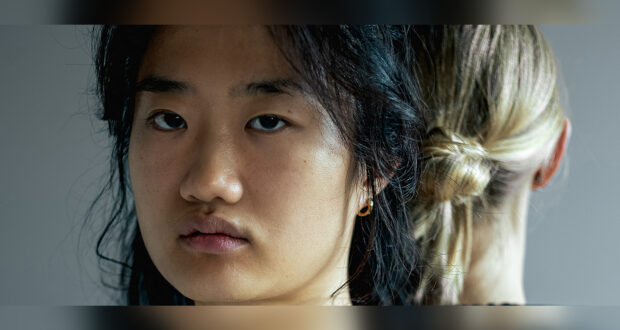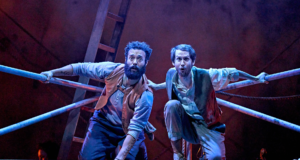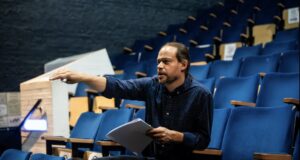MOLKA, a powerful commentary on the rise of spycam crimes in South Korea and globally.
Coming to VAULT Festival this month (7 – 9 February) is MOLKA. Molka is Korean for ‘sneaky camera’ and this debut production from Taeyun Kim and Maja Laskowska is a commentary on the rise of spycam crimes in South Korea and globally. As we’re always keen to explore ideas from around the world, we invited the whole team along for a chat to find out a little more.
Hello and thanks for talking with us, why don’t we start with introductions.
MOLKA comprises a small female-led team. Maja Laskowska and Taeyun Kim have co-created the piece and then invited Miia Mäkilä, Nikita De Martin and Izzy Southey to join the project. We are all from different places, Maja is originally from Poland, Taeyun is from South Korea, Miia is from Finland, Nikita is Italian and Izzy is from London! It’s amazing that we were able to meet and collaborate. This is also what makes the project truly unique, the diversity of perspectives and voices in it.
Tell us about the research and development process for MOLKA, you mention using personal stories and archival materials?
Molka started with a conversation between Maja and Taeyun, sharing their experiences as women in different societies, growing up in different cultures. During one of these conversations the topic of molka crimes emerged.
Molka means ‘sneaky camera’ in Korean. Taeyun spoke out about her involvement in the My Life is Not Your Porn protests in Seoul in 2018 and about the routines that many South Korean women have to resort to when they’re in public toilets in order to avoid being filmed by a camera the size of a little screw. Taeyun’s experiences have been a catalyst for our research. There are many news articles, short documentaries and YouTube videos, mostly created by women, sometimes victims of molka crimes. It’s been challenging to prioritise a single perspective and so we decided to highlight the diversity of voices. In effect, MOLKA is composed in two parts. On the one hand, there are the facts, the news coverage, the YouTube videos and on the other there are two women having a personal conversation about the state of misogyny that fuels society and their lives.
What were the challenges of collaborating with movement director Miia Mäkilä and merging different forms of storytelling in MOLKA?
Taeyun: The biggest challenge for all of us was merging the text and the movements together. Miia is great at understanding the state in which the performers are in and how to translate that into choreography so text and movement become naturally whole.
Maja: MOLKA would be one long YouTube autoplay rabbithole if it wasn’t for Miia. Her movement direction is what truly introduced a sense of urgency, protest and struggle into the piece. It would have been a challenge to structure the show without her. Both Taeyun and Nikita are from dance backgrounds which is an area that I haven’t experienced in depth. I believe that thanks to Miia, they both felt safe and clearly guided.
Nikita: I’ve been working with Miia for the past few years. Together we are part of Nimi Collective, a co-creative performance group where we experiment with non conventional ways of performing, finding new interdisciplinary languages. I can’t speak of challenges when working with Miia, I trust her research and movement directions. She was the one who invited me to apply for MOLKA audition, somehow she foresaw that I could be a part of the project despite the fact that it’s my first time using scripted text on stage!
How does MOLKA address the global aspects of molka crime, and not just in South Korea?
Taeyun: It has taken a long time for people to start talking about it in South Korea, but even though now the conversation is happening and everyone is aware of the problem, the crimes are still happening and it’s getting worse. Because of the internet, molka crimes have become a global issue. Image based sexual assault is at the core of a molka crime, which is partly the reason why the problem is so difficult to tackle. Perpetrators, who are mostly male, by uploading videos of women without their consent feed into systematic inequalities. This happens in every corner of the world and we tried to show it in MOLKA.
Nikita: The play makes references to trauma that is a consequence of voyeurism, image based sexual assault and other non-consensual sharing of identities, affecting women’s sexual autonomy, self confidence, growth and right to privacy. Image based sexual assault is a few seconds revenge that lasts a lifetime in the victim’s behaviour. It is a problem spreading even quicker through the use of phone cameras and it’s not happening just in South Korea, it’s everywhere.
What do you hope audiences will take away from MOLKA?
Taeyun: The word ‘molka’, of course. I hope the audience will Google it and see the extent of the problem. But if I could add just another one, I hope that each woman in the audience will come out of the show knowing that there’s always another woman who will listen to your story and share theirs in return.
Nikita: I hope we will generate more awareness around the topic, raise questions and urge people to talk more about it. If it becomes louder we might have a chance to reclaim our right to privacy and then I hope it’s a stepping stone for more change for the better.
Whats has the journey to VAULT festival been like?
It’s been a real joy to be a part of the festival. VAULT team is absolutely amazing in the way they facilitate the experience of participants, all the meet and greets and workshops make you feel like you’re a part of the community. We learned a lot, as practitioners and as a team and we really look forward to showing MOLKA to the audience!
What is in store next for you and for MOLKA, do you have more plans after VAULT Festival?
We are currently waiting for feedback from the Nordic Fringe Festival. We would love to take MOLKA on a European tour, build a network and share the message of the show worldwide. There are definitely plans to take MOLKA outside of London and to do that we may need more hands on board so if you enjoy the show, send us a message, we would love to connect!
Finally, do you have any recommendations for other shows to check out at VAULT Festival?
We would definitely recommend to see Cat Winter’s it’s not the sea to drink. It’s really amazing what Cat does with language and the dramaturg who worked with Cat for this performance, Ryan Morgan is really one of a kind. We also can’t wait to see other performance art folks. Takdaja company have a beautiful show titled Fruits or, the Decline of a Distant Memory which will be a must see!
Our thanks to all from MOLKA for finding time to chat. You can follow MOLKA on Twitter.
MOLKA plays VAULT Festival 7 – 9 February. Tickets and further information can be found here.
 Everything Theatre Reviews, interviews and news for theatre lovers, London and beyond
Everything Theatre Reviews, interviews and news for theatre lovers, London and beyond



